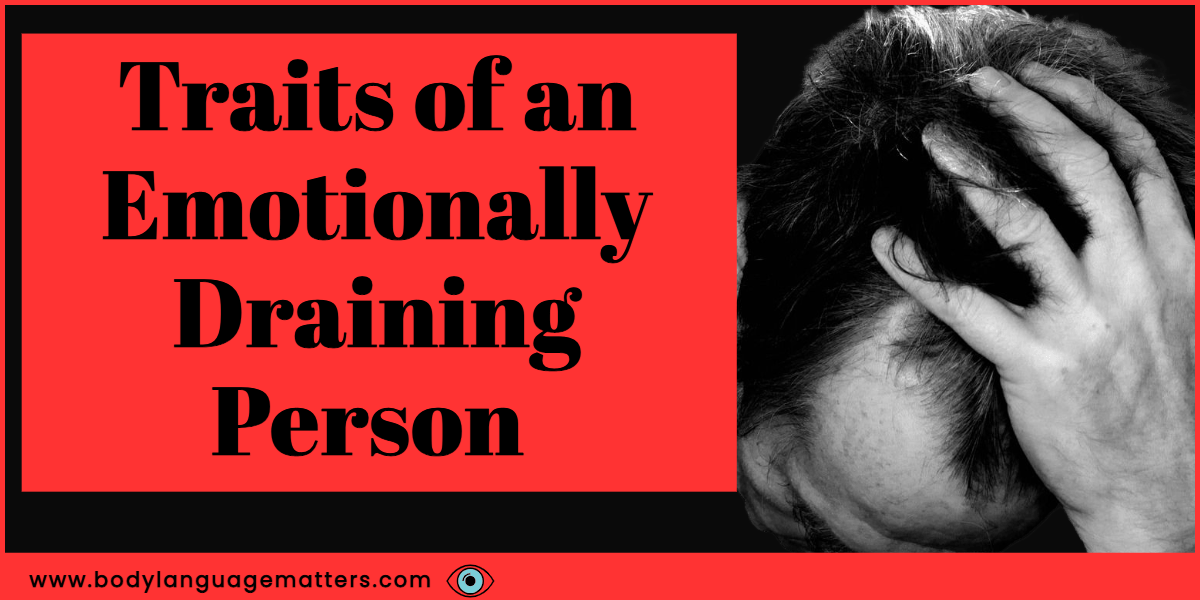So you think that you have met an emotionally draining person and want to figure out if this is the case in this post we take a look at some of the top traits.
An emotionally draining person is someone who exhausts the emotional resources of those around them. They often require a great deal of attention and energy from those around them, but rarely give anything in return. They may be overly needy, constantly requiring reassurance or validation from others. They may also be highly critical and demanding, expecting others to meet their needs without any thought for their own emotions.
Emotionally draining people can also be manipulative, using guilt or fear to control or manipulate those around them. They might even enjoy playing mind games with those they are close to in order to get what they want. All of these traits are exhausting for those forced to interact with an emotionally draining person, leaving them feeling depleted and overwhelmed.
8 Signs Of An Emotionally draining person.
- Always trying to control the situation.
- Unrelenting criticism.
- Passive-aggressive behavior.
- Unwilling to compromise.
- Avoids conflict resolution.
- Constantly asking for reassurance.
- Manipulative and deceptive.
- Drains your energy with endless complaining.
Next up we’ll look at some common traits of people who are emotionally draining.
Constant Negative Outlook.
A negative outlook can have a huge impact on those around them. The energy and attitude of a person can be contagious, and when someone has a negative outlook, it can spread to the people in their environment.
This could lead to feelings of anxiety, stress, and depression for those who are exposed to the negativity. It can create an atmosphere that does not promote positive thinking or action. People may feel like they cannot do anything right or be successful, leading to a lack of motivation and self-esteem issues.
It is important that individuals strive to maintain a positive outlook and attitude in order to create an environment that fosters collaboration, creativity, and productivity rather than one that drags people down.
Lack of Empathy.
When someone lacks empathy, it can make interactions difficult and emotionally draining. People who can’t empathize with others may not recognize the feelings of those around them or take into consideration their needs.
This can lead to misunderstandings and hurtful comments that leave the other person feeling unheard or unimportant. Without empathy, interactions become one-sided, with the person lacking empathy only looking out for themselves instead of trying to understand what the other person is experiencing.
This type of behavior can make conversations difficult and leave both parties feeling frustrated or drained. Empathy is key to forming meaningful relationships and creating a positive atmosphere in any interaction.
Unreliable or Inconsistent Behavior.
Unreliable or inconsistent behavior can have a major impact on relationships. This type of behavior causes people to question the trustworthiness of their partner, which can lead to feelings of insecurity and doubt. It can also create a sense of distance between the two parties, as one person may feel hesitant to rely on the other.
This could eventually lead to a breakdown in communication, causing issues such as resentment or anger. In addition, an individual’s unreliable behavior could cause their partner to feel unloved and unappreciated, leading to further issues in the relationship.
Unreliable or inconsistent behavior can be detrimental to any relationship, leading to mistrust and conflict.
Self-centeredness.
Being self-centered can have a negative impact on the emotional energy of those around us. When someone is overly focused on themselves, their needs, and their wants, it often leaves little room for anyone else to be heard or acknowledged.
This can lead to feelings of frustration and helplessness in others, as they feel that their presence and concerns are being ignored or invalidated. This type of behavior can lead to a lack of trust between people, as it suggests that one person does not care about the other’s thoughts or feelings.
This kind of attitude can be draining for both parties involved and can leave them feeling exhausted and isolated instead of connected to each other.
Emotional Blackmail.
Emotional blackmail is a manipulative tactic that seeks to exploit people’s emotions in order to gain something from them, such as financial support or agreement with a particular opinion.
This type of manipulation often leaves the victim feeling confused and guilty, as they are made to feel that if they do not comply with the manipulator’s demands then they will be seen as an uncaring and selfish person.
This guilt can lead to victims feeling anxious, depressed, and unable to make decisions without considering the manipulator’s wishes first. In extreme cases, emotional blackmail can lead to long-term psychological damage, and in some cases even physical abuse. It is important for all individuals to be aware of this type of manipulative
7 Ways of dealing with emotionally draining people.
There are plenty of tools you can use on people who drain your power.
- Acknowledge their feelings without agreeing or disagreeing.
- Set boundaries.
- Listen without judgment.
- Change the subject to a positive topic.
- Ask for help and support.
- Practice self-care.
- Make an action plan to manage emotions.
What is an emotionally draining person?
An emotionally draining person is someone who drains your emotional state and leaves you feeling exhausted. They can be compared to a vampire, as they suck the life out of you. They don’t necessarily have to be negative, but their energy can be so consuming that it leaves you feeling drained.
These people tend to dominate conversations and show little concern for how their actions affect those around them. It’s important to remember that these people may not understand the impact they have on others, but it’s also important for us to take care of our own emotional well-being by limiting our contact with such individuals.
Being around an emotionally draining person can leave us feeling exhausted and unable to focus on other things in life. The best advice would be to remove them from your life or block them out.
Who Are Emotional Vampires?
An emotional vampire is someone who drains the energy from their environment and exhausts those around them with their excessive need for attention and reassurance. They often have low self-esteem, causing them to be needy and self-centered.
They crave constant reinforcement and tend to make everything about themselves, leaving those around them feeling helpless and tired. This type of person may not be malicious in intent, but their neediness can still be difficult to manage as it can tire out even the most patient people.
Emotional vampires drain the emotional energy of those around them, leaving people drained and exhausted on a regular basis if not managed properly.
How to deal with emotionally exhausting people?
Dealing with emotionally exhausting people can be very draining. Every relationship has its own challenges and when it’s an emotionally exhausting one, it can tire you out quickly.
It’s important to stay empathetic and try to understand where they are coming from while also staying aware of your own needs and boundaries. Letting them know that you want to help is important, but don’t let yourself get so wrapped up in their problems that you forget about your own needs.
If the person is self-centered, it may be best to distance herself a bit until they become more aware of how their behavior affects others. If it gets too overwhelming, take some time for yourself away from the situation and de-stress.
Signs of an emotionally draining relationship.
Signs of an emotionally draining relationship can often be difficult to spot initially. However, some common warning signs include feeling drained after spending time with your partner, feeling like you are the only one putting in the effort, having frequent arguments, or not feeling heard or respected by your partner.
If you find yourself avoiding conversations with your partner or worrying about how they might react to something that you do or say, this could be a sign of an emotionally draining relationship.
If any of these signs are present in your relationship, it is wise to address them with your partner and make sure that both parties’ needs are being met. If needed, consider seeking help from a qualified mental health professional who can provide guidance on how to
Why is being emotional a weakness?
Being emotional is considered a weakness because it can lead to irrational decisions, poor communication, and damaging relationships. Emotions are powerful and can often be overwhelming.
If someone allows their emotions to take over their actions and decisions, they may end up hurting themselves or the people around them. They also may not make the best decision for their future or well-being due to being controlled by their feelings.
It is important that people learn how to control their emotions in order to make rational choices, communicate effectively and maintain healthy relationships. Learning how to manage your emotions will help you stay in control of your life and make better decisions for yourself in the long run.
What does emotionally draining mean?
Emotionally draining is a term used to describe an experience that takes an emotional toll on someone. It can refer to anything from a challenging work situation, to an argument with a friend, to a difficult family dynamic.
When you are emotionally drained, it means that the experience has taken so much out of you emotionally that you feel exhausted and overwhelmed. Symptoms of being emotionally drained may include feeling numb, unmotivated, irritable, hopeless, or anxious. It’s important to recognize when you are feeling this way and take steps to restore your emotional energy.
This could involve taking time for yourself and engaging in activities that make you happy or spending time with people who make you feel uplifted and supported.
What is an emotionally detached person?
An emotionally detached person is someone who tends to keep their emotions at arm’s length. They often have difficulty connecting with others, and may not be able to express how they feel or what they need. They may also appear indifferent to the feelings of those around them and may seem uninterested in forming relationships.
Emotionally detached people often struggle with communication due to their lack of ability to express themselves and their difficulty in understanding the emotions of others. They can be very guarded and find it hard to trust others.
These individuals may even have a difficult time understanding their own feelings, which can make it hard for them to form meaningful connections with others.
Final Thoughts
When it comes to traits of an emotionally draining person there are many you can look out for but the best advice we can offer is to move away from them and think about what you want from your life. You want to be positive and happy as life is too short.
We hope we have answered your question in this post you may also like to check out Signs a Man Is Hurt Emotionally (Clear Sign)

